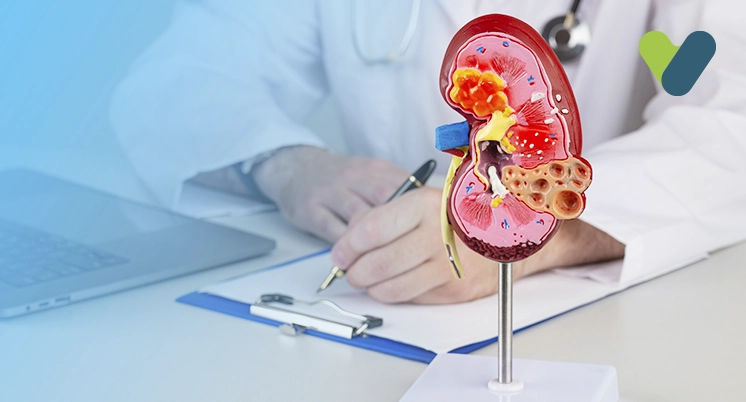Addison’s disease, also known as hypoadrenalism or primary adrenal insufficiency, is an uncommon disorder that occurs when adrenal glands, which are located on top of each kidney, are unable to produce a sufficient quantity of hormones aldosterone and cortisol. These hormones are essential for maintaining the body's balance of electrolytes and water as well as for regulating the body's response to stress.
Let us find out more about the disease of the adrenal gland-Addison’s disease.
What is Addison's disease?
Addison's disease is a long-term condition wherein the adrenal glands fail to produce enough cortisol and aldosterone.
The adrenal glands, also referred to as suprarenal glands, are triangle-shaped, small glands that are situated on top of the two kidneys. They are the parts of the endocrine system. Cortisol is a stress hormone that aids the body's response to illness, injury, or surgery. It also aids in the maintenance of blood pressure, the immune system, heart function, and blood sugar (glucose) levels. Cortisol is necessary for survival.
Aldosterone, another hormone produced by the adrenal gland, regulates the potassium and sodium (salt) levels in the blood. This, in turn, regulates the quantity of fluid removed by the kidneys as urine, which impacts blood pressure and blood volume.
Primary adrenal insufficiency is another name for Addison's disease. Secondary adrenal insufficiency occurs when the pituitary gland fails to produce sufficient adrenocorticotropic hormone (ACTH), which stimulates the adrenal glands to produce cortisol.
Symptoms of Addison’s Disease
Addison's disease causes gradual damage to the adrenal glands; therefore, the symptoms appear gradually. The symptoms vary from individual to individual.
Addison's disease symptoms include:
In some cases, like after an injury, a severe illness, or a period of massive stress, the symptoms of this condition can appear quickly and cause a potentially fatal event known as acute adrenal failure. This is a medical emergency called an Addisonian crisis. It may cause shock and death if not treated.
The symptoms of an Addisonian crisis include:
If someone is having these symptoms, visit the nearby hospital immediately.
When should you see a doctor?
Consult a doctor if anyone has any of the following Addison's disease symptoms:
Causes of Addison’s disease
Addison’s disease can be caused by a variety of underlying conditions, including autoimmune disorders, infections, and certain medications. The most common cause of the disorder is an autoimmune disorder, in which the body's immune system mistakenly attacks and damages the adrenal glands. This can lead to the inflammation, scarring, and, eventually, destruction of the glands. Other causes of Addison's disease include infections such as tuberculosis and HIV as well as certain medications, including those used to treat inflammatory disorders or cancer.
Diagnosis of Addison's disease
A doctor will ask for information regarding the medical history as well as the associated symptoms one has been experiencing. They will perform a physical examination for the signs of low blood pressure or pigmentation changes on the skin and may order laboratory tests to check sodium and potassium levels.
The doctor may also recommend imaging tests such as computed tomography (CT) or magnetic resonance imaging (MRI), which can help identify any structural abnormalities in the adrenal glands and assess the patient’s hormone levels (hormones produced by the adrenal glands, such as cortisol and aldosterone).
Treatment for Addison's disease
Treatment for Addison’s disease involves replacing the hormones with synthetic forms of cortisol and aldosterone, which cannot be produced by the adrenal glands. Hydrocortisone is used for cortisol replacement, and fludrocortisone is used as aldosterone replacement. Since Addison's disease is a lifelong illness, people with Addison's disease will require medications for the rest of their lives. These medications have different dosages for every individual, and the healthcare professional may increase the dosage in case one has an infection, trauma, surgery, or other stressful situation, to prevent an acute adrenal crisis.
If someone is taking fludrocortisone, their doctor may advise them to consume more salt, particularly in humid and hot climates and after vigorous exercise.
It is also important for people with Addison’s disease to avoid stress as much as possible, as stress can cause the body to release hormones that can further deplete the adrenal glands. People with Addison's disease should also be aware of the signs and symptoms of an adrenal crisis, which is a serious condition that can occur when the body is unable to produce enough hormones to cope with stress. Signs of an adrenal crisis include severe abdominal pain, vomiting, dehydration, and a rapid heartbeat.
Takeaway
In conclusion, Addison’s disease is a rare disorder that occurs when the adrenal glands are unable to synthesise an adequate amount of the hormones cortisol and aldosterone. It can lead to a wide range of symptoms, including fatigue, muscle weakness, weight loss, and skin darkening. Its treatment typically involves replacement therapy with the hormones cortisol and aldosterone as well as treatment for any underlying causes of the disorder. With proper treatment, people with Addison's disease can lead normal, healthy lives.


